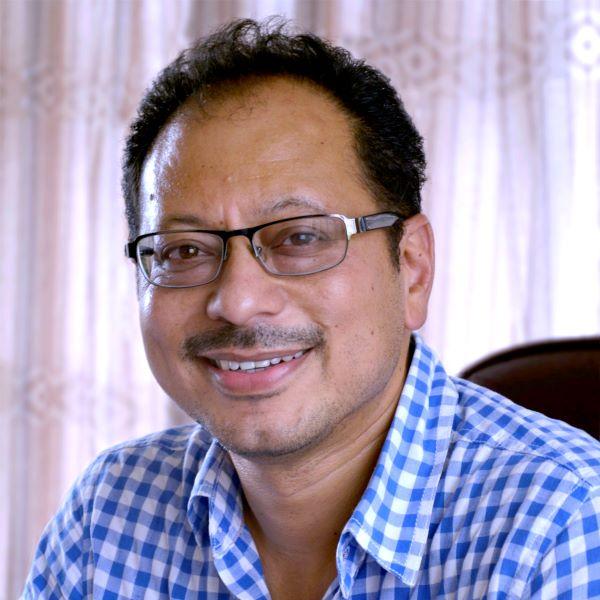Prabin Manandhar
Dr. Prabin Manandhar has over 25 years of experience in international development and international relations with excellent diplomatic, management and communication skills. He has a PhD in Development Studies from the University of East Anglia, a Master in Public Administration and a Bachelor in Civil Engineering. He has professional training in International Cooperation, Foreign Affairs, Human Rights and Gender Equality, Results-Based Management, Conflict Management and Climate Risk Management.
Dr. Manandhar has wide experience in post-graduate teaching, development research and PhD supervision. He is the author of several publications and he has presented various papers at national and international seminars.
Dr. Manandhar is currently working in Iraq as the Country Representative of the Lutheran World Federation and the Convener of the ACT Alliance Forum. He is the Immediate Past Chair of the Association of International NGOs in Nepal (AIN).

Speaker's Corner
My EUVP visit took place in 2010 at a time when Nepal was emerging from a violent conflict and working towards a new constitution through a constituent assembly. Based on my interests, I attended several meetings covering the areas of (i) Education, Culture and Research (ii) Development and Humanitarian Aid (iii) External Relations and (iv) Trade.
In particular, I was enlightened about the existence of the Jean-Monnet Programme, now part of Erasmus +, that I found interesting as it supports information and research with the aim of promoting discussion, reflection, and knowledge about the process of European integration. In Nepal, this programme could be used to promote the EU and foster academic and cultural exchanges through a Europe House or association of like-minded people involved in education and research. In that way the visibility of the EU in Nepal would be stronger. I also found the interaction with the European Institute of Asian Studies (EIAS), a Brussels-based think tank and policy research centre, very interesting. The EU and Nepal could benefit in connecting further the research, practice and policy for a greater understanding between the EU and South Asia.
It was fascinating to exchange views with EU officials and Members of the European Parliament about the political economy of conflict, peace, federalism and development, and the EU-Nepal relations. I also had an opportunity to discuss the EU aid programme in Nepal including the EU Country Strategy for the period 2007-2013. I provided my recommendations to increase results and financial monitoring of the EU projects in the fields of renewable energy, human rights, conflict mitigation and support, and basic and primary education. This would in turn help to improve evidence-based advocacy to strengthen enabling policy and legal environment in Nepal. I also raised concern about the weak linkage between the EU Aid Program and the ECHO humanitarian support.
During the EU Visitors’ Programme visit, I learned a great deal about how the EU is functioning, how it evolved from the concept of a single market and ensured freedom of movement of people, goods, services, and capital. I developed a good understanding of the bilateral trade relationship between the EU and Nepal and how Nepal can intensify dialogue to benefit from generous trade arrangements through the Everything But Arms initiative.
The EU is a global actor and its immense soft power can positively influence academics, economies and security imperatives on the global arena. I found the EU perspective on international development, trade and federalism a provoking thought.
The current challenges are displacements of people, a shrinking space for civil society, disaster risks and weak governance in the humanitarian-peace-development nexus.
We are the leading association of international NGOs in Nepal and ACT Alliance National Forums in Nepal and Iraq. In that respect I have a couple of achievements to mention that have been particularly important for me as a person.
My contribution to the drafting of Basic Operating Guidelines (BOGs) to protect and promote development space for development partners during the violent conflict in Nepal as well as my contribution to the drafting of minimum condition and performance measurement for local governance in Nepal are among those achievements in my professional career that I cherish dearly.
Moreover, our work regarding the earthquake response to saving lives, recover livelihoods and rehabilitate socio-economic infrastructure in Nepal has also had a direct and reel impact for the people in Nepal.
Finally, our response to internally displaced people, Syrian refugees and host communities in Iraq are consequential.
I find young people inspiring for what they do and I believe they can do even more. They need to be empowered and motivated for developing their skills, seize their opportunities and realize their full potential as a dynamic force for building inclusive and resilient societies.
Technology is bringing youth together for learning and businesses as digital platform solutions are taking shape. We need to take immediate action to address the digital divide for equitable learning and business opportunities as we move forward especially for rural and marginalized young people. Furthermore, there are young people in need such as migrants, displaced people, persons with disabilities, survivors of gender-based violence and people with chronic diseases who need urgent support and protection.
The interview took place in July 2021
The opinions expressed by the EUVP distinguished Alumni on the Wall of Fame do not necessarily reflect the official EU position.
